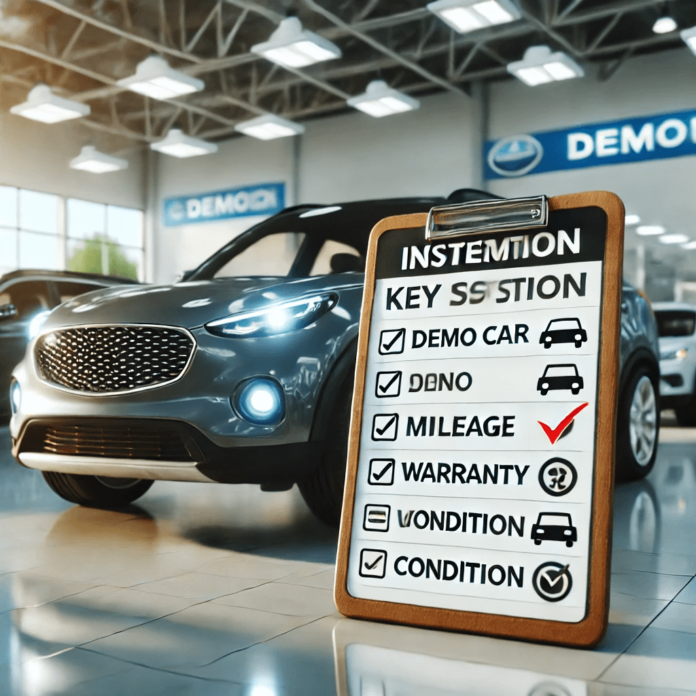Introduction
- 1. Check the Mileage
- 2. Inspect the Condition of the Vehicle
- 3. Ask for the Vehicle History Report
- 4. Understand the Warranty Coverage
- 5. Check for Any Dealer Incentives or Discounts
- 6. Test Drive the Car Yourself
- 7. Negotiate the Price
- 8. Confirm the Vehicle’s Title Status
- 9. Consider Depreciation
- What to Look for in a Demo Car
- Conclusion
- Frequently Asked Questions (FAQs)
When considering purchasing a demonstration vehicle, knowing what to look for in a demo car is crucial for making a smart investment. Demo cars offer great value, but there are key factors to consider, such as mileage, condition, and warranty. By following these demo car buying tips, you can ensure that you’re getting a well-maintained car at the right price. This guide will walk you through the essential checks and questions to ask when buying a demo car, helping you make an informed decision.
1. Check the Mileage
Demo cars typically have low mileage, but the exact number can vary depending on how frequently the vehicle was used for test drives or by dealership staff.
Although demo cars are often in excellent condition, they aren’t technically “brand-new” because they’ve already been driven and used for test drives or dealership purposes.
Tip: Look for demo cars with mileage under 10,000 miles. The less mileage a demo car has, the closer it remains to its “like-new” condition, preserving its value and appeal.
2. Inspect the Condition of the Vehicle
Since demo cars are used by multiple drivers, it’s crucial to thoroughly inspect the vehicle for any signs of wear and tear. This involves thoroughly inspecting both the interior and exterior of the vehicle for any signs of damage or wear.
Tip: Look for scratches, dents, or worn upholstery, and don’t hesitate to ask the dealer to fix minor issues before finalizing the purchase.
3. Ask for the Vehicle History Report
Although demo cars are typically well-maintained, it’s still essential to request a full vehicle history report. This report will give you insights into any past incidents, maintenance history, and whether the car has been in any accidents.
- Tip: Use the vehicle history report to verify the car’s condition and confirm that it hasn’t undergone any significant repairs or damage.
4. Understand the Warranty Coverage
When purchasing a demo car, the original manufacturer’s warranty usually remains in effect, providing coverage for repairs and services. However, the coverage period may be reduced depending on how long the car has been in service at the dealership.
- Tip: Ensure you know when the warranty started and how much coverage remains. If the remaining warranty is limited, it’s wise to negotiate for extended warranty options to ensure long-term coverage and peace of mind.
5. Check for Any Dealer Incentives or Discounts
Dealerships often offer special incentives or discounts on demo cars to move them off the lot. These may include lower interest rates, cash rebates, or free maintenance services.
- Tip: Ask the dealer if there are any current promotions or deals available for demo cars to maximize your savings.
6. Test Drive the Car Yourself
Even though a demo car has been used for test drives by others, it’s important that you take it for a spin yourself. This will allow you to assess the car’s performance, handling, and comfort firsthand.
- Tip: Pay attention to any unusual noises, braking performance, or transmission issues during the test drive.
7. Negotiate the Price
Since demo cars have already been driven, there’s often room to negotiate the price. Take into account the mileage, any wear and tear, and the amount of warranty left when discussing the final cost.
- Tip: Use the vehicle’s usage and condition as leverage to negotiate a better deal, and compare the price to similar new or used cars on the market.
8. Confirm the Vehicle’s Title Status
Even though demo cars haven’t been privately owned, it’s still important to ensure the car has a clean title. This will avoid any issues when it comes to insurance or reselling the vehicle.
- Tip: Ask the dealer to confirm the car’s title status and provide documentation that it’s free of any liens or legal encumbrances.
9. Consider Depreciation
While demo cars come with a discount compared to brand-new cars, they may have already experienced some depreciation. This is especially true if the car has been in service for a year or more.
- Tip: Keep in mind the vehicle’s depreciation rate when negotiating the price, and understand how this affects the car’s future resale value.
What to Look for in a Demo Car

When buying a demo car, it’s essential to pay close attention to several key factors to ensure you’re making a sound purchase. Here’s a checklist of key factors to consider when evaluating a demo car:
Mileage
Demo cars typically have low mileage, but it’s important to check how much the car has been driven. The fewer miles on the odometer, the more the car retains its near-new condition, offering better value for buyers. Aim for vehicles with fewer than 10,000 miles to get the most value.
Condition
Even though demo cars are generally well-maintained, they are used by multiple drivers. Carefully examine both the interior and exterior of the car for signs of wear, such as scratches, dents, or damage to the upholstery, to ensure it’s in good condition. Minor issues can often be addressed by the dealer before purchase.
Warranty Coverage
Confirm how much of the original manufacturer’s warranty is left. In many cases, the warranty begins when the dealership starts using the car, so there may be less coverage available compared to a brand-new vehicle.
Vehicle History Report
Ask for a vehicle history report to ensure that the car hasn’t been involved in any accidents or needed major repairs. This will give you peace of mind about the car’s condition and background.
Conclusion
Purchasing a demo car offers the advantage of getting a nearly-new vehicle at a lower price, but it’s crucial to carefully inspect the car and ask key questions to ensure you’re making a smart investment. By following these essential tips, you can ensure that you’re getting a demo car that’s in good condition, has sufficient warranty coverage, and provides excellent value for your money.
Frequently Asked Questions (FAQs)
1. Is buying a demo car worth it?
Yes, if you’re looking for a nearly-new vehicle at a discounted price, buying a demo car can offer significant savings and excellent value.
2. Can I negotiate the price of a demo car?
Yes, there is usually room for negotiation when buying a demo car, especially considering factors like mileage, condition, and warranty coverage.
3. How much warranty is left on a demo car?
The remaining warranty on a demo car depends on when the car first went into service, so it’s essential to confirm the exact coverage with the dealer.














